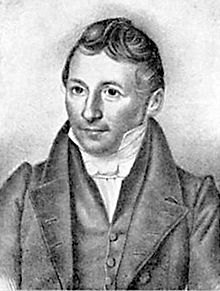Moritz Wilhelm Müller
Moritz Wilhelm Müller (born August 11, 1784 in Klebitz ; † November 23, 1849 in Leipzig ) was a German physician and is considered a pioneer of homeopathy .
Life
Moritz Wilhelm Müller was a son of the pastor Augustus Müller (born October 1, 1745 in Bergwitz, † November 8, 1801 in Klebitz) and his wife, Benjamina Sophie Groß. He came from an old Saxon family of pastors, who can prove some important personalities through family relationships. One could easily name the names of his great-aunt Ernestine Christine Reiske , his great-uncle Gottlieb Müller or his distant relative Karl Ludwig Nitzsch .
As was not unusual at the time, he had received his first training from his father. At the age of eleven he entered the grammar school in Torgau , which he attended until he was seventeen. On October 9, 1800, he enrolled at the University of Wittenberg and devoted himself to studying medical sciences. Here he had attended the lectures on physiology with Wilhelm Traugott Krug and those of the other medical special sciences with Friedrich Ludwig Kreysig , Burkhard Wilhelm Seiler and Johann Friedrich Erdmann . Here he also got to know Georg August Benjamin Schweikert as a friend, who at that time was trying to become a university lecturer and who would later get him enthusiastic about homeopathy. After Müller passed his exam pro canditura med. graduated and considered Wittenberg useless for his development, he moved to the University of Leipzig at the age of twenty-first .
In Leipzig he became an assistant at the Jakobshospital and assistant doctor. At the end of November 1809, the magistrate and the university made him vicarious director of the institution. After Müller had acquired the academic degree of a Magister on December 23, 1809, he received his doctorate on January 19, 1810 with the treatise de febre inflamatoria to the doctor of medicine. Müller completed his habilitation as a private lecturer in 1812, had his own practice in Leipzig and during the coalition wars he participated in the medical care of the population in the Leipzig area. On October 31, 1814, he married Rosetta Neus, from which marriage the son Dr. Clotar Müller is known and a daughter who is a certain Dr. Kurzel married.
In 1820 Müller became a supporter of the new reformed healing art of homeopathy and in 1829 the first director of the German Central Association of Homeopathic Doctors . From 1829 onwards, he held lectures at the University of Leipzig on the subject of Leipzig semi -homeopaths , hermaphrodites and bastard homeopaths . In January 1833 he became the first director of the first homeopathic Leipzig hospital in Johannesvorstadt in Glockenstrasse. 1. However, the arguments of the leading homeopaths about Samuel Hahnemann at that time caused him to resign in September of the same year. These disputes also clouded the relationship with his long-time comrade Schweikart. From then on he became involved in the free homeopathy association founded in 1834, for which he worked until the end of his life. Müller is considered to be the founder of the scientific-critical direction of homeopathy, a free instead of pure homeopathy, which also allows antipathic-palliative principles. Müller was also a member of the Natural Research Society in Leipzig .
Müller was the family doctor for Robert Schumann and his wife Clara .
Works
- De schola Lipsiensium clinica. 1809
- On the history of homeopathy. 1830, 1837
- Cholera morbus or brief history of the origin and course of the Indian epidemic nausea as it has ruled since 1817, together with its healing method and the protective precautionary measures for educated people of all classes. 1831
literature
- Georg Otto Kleinert: History of Homeopathy. Verlag Ernst Schäfer, Leipzig, 1863, p. 122 ( online )
Web links
- Literature by and about Moritz Wilhelm Müller in the catalog of the German National Library
- Overview of Moritz Wilhelm Müller's courses at the University of Leipzig (winter semester 1814 to winter semester 1833)
- English CV
Individual evidence
- ↑ She was the daughter of the pastor in Kaltenborn near Jüterbock Johann Gottfried Groß * October 12, 1704 in Lengenfeld near Sangerhausen, son of Johann Kaspar Groß and Barbara Öler, attended the grammar school in Sangerhausen, from January 20, 1721 to April 3, 1726 Schulpforta (CFH Bittcher: Pförtner Album. Verlag Friedrich Christian Wilhelm Vogel, Leipzig, 1843, p. 265) and the University of Leipzig, on March 25, 1745 he was ordained and from 1745 was pastor in Kaltenborn, Jüterbog district. Married February 1746 Magarethe Elisabeth Eilenburg, who was the daughter of the pastor in Pechüle Johann Christian Eilenburg and † on January 14, 1789 Kaltenborn cf. Otto Fischer: Evangelical Pastor's Book for the Mark Brandenburg since the Reformation. P. 270
- ↑ cf. Veronika Albrecht-Birkner : Pastors book of the church province of Saxony. Evangelische Verlagsanstalt, Leipzig, 2007, ISBN 978-3-374-02138-3 , Vol. 6, pp. 168–170
- ^ Fritz Juntke: Album Academiae Vitebergensis - Younger Series. Max Niemeyer Verlag, Halle (Saale), 1966, part 3; P. 321
| personal data | |
|---|---|
| SURNAME | Müller, Moritz Wilhelm |
| BRIEF DESCRIPTION | German physician and is considered a pioneer of homeoepathy |
| DATE OF BIRTH | August 11, 1784 |
| PLACE OF BIRTH | Klebitz |
| DATE OF DEATH | November 23, 1849 |
| Place of death | Leipzig |
